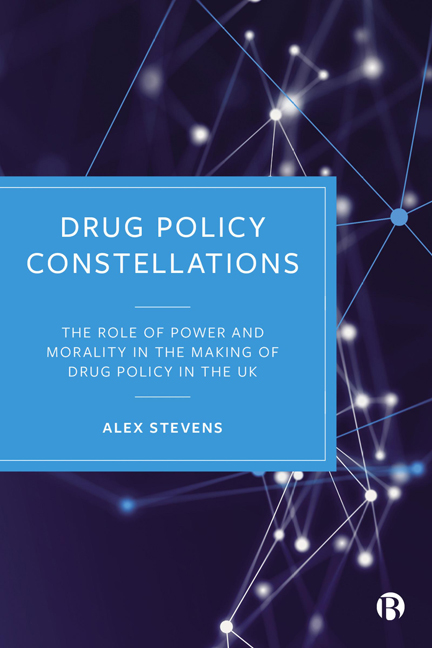Book contents
- Frontmatter
- Dedication
- Contents
- List of Figures and Tables
- About the Author
- Preface
- 1 An Introduction to Drug Policy Constellations
- PART I Contexts, Concepts and Methods for Studying Drug Policy Constellations
- PART II Morality and Power in UK Drug Policy Constellations
- PART III Cases in Drug Policy Making in the UK
- Notes
- References
- Index
12 - A Retroductive Conclusion
- Frontmatter
- Dedication
- Contents
- List of Figures and Tables
- About the Author
- Preface
- 1 An Introduction to Drug Policy Constellations
- PART I Contexts, Concepts and Methods for Studying Drug Policy Constellations
- PART II Morality and Power in UK Drug Policy Constellations
- PART III Cases in Drug Policy Making in the UK
- Notes
- References
- Index
Summary
The final stage of a critical realist analysis is retroduction and contextualisation (Danermark, Ekstrom and Karlsson, 2019). Retroduction explains the underlying mechanisms and causal conditions of the observed phenomena; in this case, the outcomes of drug policy processes in the UK. Contextualisation highlights areas where potential theoretical explanations compete or complement each other. These alternatives complement a sociological analysis which aims to trace the specificities of the links between structure and agency in particular policies, times and places (Stevens, 2011d).
This chapter carries out retroduction by proposing ten tendencies that I found in the making of drug policy in the UK, tendencies which may also apply to other policy fields in other places. The chapter contextualises these conclusions by comparing the policy constellations approach to the advocacy coalition framework (ACF; Jenkins-Smith et al, 2018), with which it shares several features but two crucial differences. One difference is that the policy constellations approach rejects the methodological individualism on which the ACF is built. The other is that coalitions are characterised by their coordination strategies, whereas constellations are not necessarily coordinated. The chapter will then consider some limitations and trade-offs in my choice of methods for studying drug policy. In the end, the analysis presented in this book should be judged by its practical adequacy. How does the knowledge it creates and shares help us to reduce human suffering and promote collective thriving? The chapter and the book close by considering these questions.
Retroduction: the propositions of the policy constellations approach
To help understand how constellations of actors, ideas, power, interests and moralities combine to produce policy outcomes, I present here some propositions for understanding this process. I created these propositions abductively by combining theories of power, morality and policy making with my observations of the UK drug policy field (Danermark et al, 2019). I present them here alongside my retroductive reflections on how they throw light on some interesting aspects of the cases I observed.
Policy making is not a process that is governed by immutable causal laws, as if ‘social reality consists of a ubiquity of closed systems of isolated atoms’ (Lawson, 2019, p 6).
- Type
- Chapter
- Information
- Drug Policy ConstellationsThe Role of Power and Morality in the Making of Drug Policy in the UK, pp. 160 - 176Publisher: Bristol University PressPrint publication year: 2024

